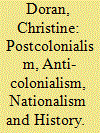|
|
|
Sort Order |
|
|
|
Items / Page
|
|
|
|
|
|
|
| Srl | Item |
| 1 |
ID:
092971


|
|
|
|
|
| Publication |
2009.
|
| Summary/Abstract |
This paper investigates the relationship between regional and national identities in the age of globalisation, with particular reference to the Association of Southeast Asian Nations (ASEAN). For members of ASEAN, economic integration is seen as a necessary step forward in order to (i) reduce reliance on Western countries during times of economic crisis and (ii) speed up the recovery process in the aftermath of a crisis. The concept of an ASEAN Economic Community represents a step towards achieving this goal. However, by means of a case study, this paper demonstrates that the idea of an ASEAN Economic Community does not yet have sufficiently solid foundations. Cracks appear when member states act in response to national interest. Given the frequency of friction between member nations, and the fact that ASEAN members are quite diverse in both economic and cultural respects, there is still much more to be done to realise the objective of forming an effective and credible regional economic group. In this paper some suggestions are offered that might assist with the achievement of this goal.
|
|
|
|
|
|
|
|
|
|
|
|
|
|
|
|
| 2 |
ID:
167046


|
|
|
|
|
| Summary/Abstract |
One of the most outstanding historical developments of the twentieth century was the gaining of national independence from imperial rule by most of the formerly colonized countries, especially in Africa, Asia and the Pacific. Yet, rather surprisingly, many of the leading contributors to postcolonial theory, including Edward Said, Gayatri Spivak, Homi Bhabha and others, tend to minimize the significance of national independence and take a dim view of the nationalist movements, leaders and ideologies that struggled for it. The aim of this article is to probe the reasons for this, canvassing postcolonial theorists’ main arguments and outlining certain intellectual currents and commitments, notably poststructuralism, deconstruction and postmodernism, that have contributed to these negative stances. Some counterarguments are presented, as it is suggested that the achievements of nationalist revolutions in the former colonies should be reassessed more favourably. This could be a way of resisting the current hegemonic power of the ideology of globalization.
|
|
|
|
|
|
|
|
|
|
|
|
|
|
|
|
|
|
|
|
|